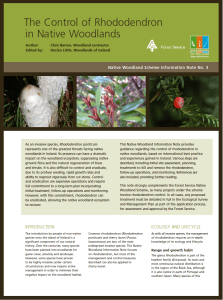
Rhododendron (R. ponticum) Nectar Is Lethal To Honeybees
Within six hours after consumption, honeybees exhibited an acute lethal response to R. ponticum nectar.
(Extract from:Nectar chemistry modulates the impact of an invasive plant on native pollinators)
DOWNLOAD full report below
Irish pollinators are in decline. The problem is serious and requires immediate attention to ensure the sustainability of our food production, avoid additional economic impact on the agricultural sector, and protect the health of the environment.
(Extract from: All-Ireland Pollinator Plan 2015-2020)
A single rhododendron ponticum can produce a million dust-like seeds – it’s impossible to clear an area once and expect it to remain cleared for good. The shade from its canopy of evergreen leaves eradicates all life beneath it; the plant can resist frost and survive fire. Given the chance, it would happily swallow Ireland’s ancient woodlands.
(Irish Times- Sat, August 15, 2015)
The nectar proved to be extremely toxic to the native Irish honeybee species as it killed individuals just hours after they had consumed even the smallest doses. The nectar also had negative impacts on the foraging behaviour of a native Irish solitary bee species, such that individuals became paralysed after feeding. This research therefore demonstrates that invasive Rhododendron will never provide a viable food resource for bees susceptible to nectar grayanotoxins.



